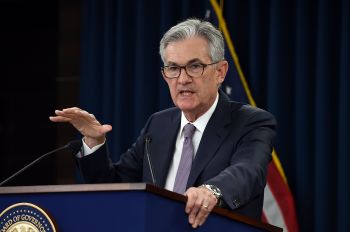Fed mulls inflation prevention measures
TEXT OF STORY
Kai Ryssdal: The Federal Reserve started one of its regular two-day meetings today. The mood in the boardroom in the Fed’s building on Constitution Avenue is probably a little more tense than usual. There’s still some degree of uncertainty about whether the Senate is going to give Ben Bernanke another term running the central bank. A vote on that, by the by, should happen by the end of the week.
But politics aside, there is that little matter of interest rates. The Fed is expected to keep its Federal Funds Rate right where it is, that is low, for many months to come. But when the Fed does eventually decide to raise interest rates, it may have to find another way to do it as Marketplace’s Jeremy Hobson explains now from New York.
JEREMY HOBSON: The Federal Funds Rate is what banks charge each other to borrow money overnight. The Fed sets a target rate and then buys or sells securities to bring the actual rate in line.
Bruce McCain is chief investment strategist with Key Private Bank. He says it worked until Lehman Brothers collapsed, and the Fed flooded the economy with cash.
BRUCE MCCAIN: We’ve had to go so far beyond merely changing interest rates to putting money into the system in ways that are truly outside the bounds of the normal interventions that the Federal Reserve has used in the past.
Because there is so much cash in the system now, buying or selling a few billion dollars worth of Treasury bonds barely moves the needle.
Ray Stone is a managing director of Stone and McCarthy Research Associates. He says making the old system work now would require the Fed to scale back its balance sheet fast.
RAY STONE: To do that, they would have to sell loads of assets, like mortgages, to the tune of a trillion dollars or more. This is operationally pretty difficult.
So there’s a new idea being floated. When the Fed wants to raise interest rates, it could start paying banks more to store their excess cash reserves.
STONE: So for example, if the Fed wants to tighten to 1 percent from a quarter, they will raise the interest rate on bank reserves to 1 percent. With that, it’s thought that the Federal Funds Rate will rise in accordance with the interest rate paid on bank reserves.
Because presumably, no bank would accept less interest for an overnight loan to another bank than it’s getting to store its money at the Fed.
In New York, I’m Jeremy Hobson for Marketplace.
There’s a lot happening in the world. Through it all, Marketplace is here for you.
You rely on Marketplace to break down the world’s events and tell you how it affects you in a fact-based, approachable way. We rely on your financial support to keep making that possible.
Your donation today powers the independent journalism that you rely on. For just $5/month, you can help sustain Marketplace so we can keep reporting on the things that matter to you.


















